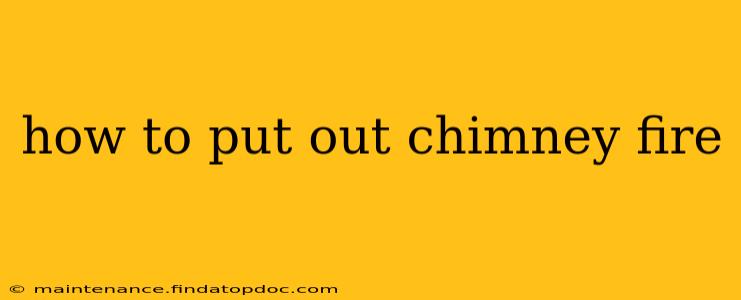How to Put Out a Chimney Fire: A Comprehensive Guide
A chimney fire is a terrifying experience, but knowing what to do can significantly reduce the damage and risk to your home and family. This guide provides a comprehensive approach to extinguishing a chimney fire and preventing future occurrences. Remember, your safety is paramount. If you're unsure about any step, immediately call your local fire department.
What to Do When You Suspect a Chimney Fire
The first sign of a chimney fire is often crackling or popping sounds emanating from the chimney or fireplace. You might also see smoke or sparks coming from the chimney. If you suspect a chimney fire, immediately evacuate your home and call your local fire department. While waiting for help, you can take the following steps, but do not attempt to fight the fire yourself unless you are a trained professional:
- Close all fireplace dampers and doors: This will restrict the airflow to the fire, potentially slowing its spread.
- Open windows and doors: This helps to ventilate your home and reduce the buildup of smoke.
- Keep everyone outside and a safe distance from the house: Until the fire department arrives, ensure everyone remains well away from the structure.
What NOT to Do During a Chimney Fire
Several actions can worsen the situation and put you in danger. Absolutely avoid:
- Pouring water down the chimney: This can cause the fire to spread or cause a steam explosion, potentially damaging the chimney structure.
- Using a garden hose: Similar to pouring water, using a garden hose can be ineffective and even dangerous.
- Attempting to climb onto the roof: This is extremely dangerous and best left to trained firefighters.
- Ignoring the fire and hoping it will go out on its own: Chimney fires can quickly spread to the surrounding structure, causing significant damage and posing a serious fire risk.
Preventing Future Chimney Fires
Prevention is key to avoiding chimney fires. Regular maintenance and inspections are crucial:
- Regular Chimney Inspections: A professional chimney sweep should inspect your chimney at least once a year, ideally before the heating season begins. They can identify any creosote buildup or structural issues that could lead to a fire.
- Creosote Removal: Creosote is a highly flammable byproduct of burning wood. Regular cleaning removes this buildup, drastically reducing the risk of a fire.
- Proper Wood Burning Techniques: Burn only dry, seasoned hardwood. Avoid burning softwoods, treated lumber, trash, or other materials not designed for fireplaces. Maintain a good airflow within the fireplace.
- Keeping the Fireplace Surround Clear: Keep the area around the fireplace free of flammable materials such as furniture, curtains, or rugs.
What Causes Chimney Fires?
Chimney fires are primarily caused by the accumulation of creosote. This flammable substance builds up over time from burning wood and other fuels. Other causes include:
- Improper Installation: Incorrectly installed chimneys can create drafts and increase the risk of fires.
- Birds' nests or other obstructions: These can block the chimney and restrict airflow, leading to heat buildup and potential ignition.
- Lightning strikes: In rare cases, lightning can strike the chimney, causing a fire.
How Often Should You Have Your Chimney Inspected?
At least once a year, ideally before the start of the heating season. This allows professionals to detect potential problems before they become serious. More frequent inspections may be necessary depending on how often you use your fireplace and the type of wood you burn.
Can I Put Out a Chimney Fire Myself?
No, unless you are a trained firefighter or chimney sweep, you should never attempt to put out a chimney fire yourself. The risks involved are too high. Your immediate priority is to evacuate the house and call the fire department.
By following these preventative measures and knowing what to do in case of a chimney fire, you can significantly reduce the risk to your home and family. Remember, prevention and professional help are crucial for dealing with this serious issue.
